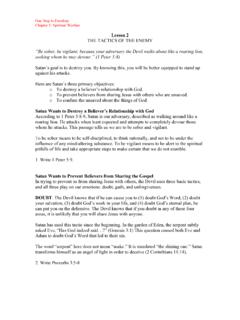Transcription of The Great Enemy Within - Reformed Online
1 The Great Enemy Within Brian Schwertley What is the greatest Enemy of a Christian's holiness? Is it the allurement of the world or the attacks of Satan? No. It is neither of these things. The greatest Enemy of a believer's sanctification is the old sin nature that remains in Christians. In the New Testament when the subject of sanctification is considered there usually is a discussion of the remaining power of indwelling sin. A variety of terms are used to describe this inner Enemy : the flesh (Gal. 5:17), the body of death (Rom. 7:24), the law of sin (Rom. 7:23) or of sin and death (Rom. 8:2), sin living in me (Rom. 7: 17), and the old man (Rom. 6:6; Eph. 4:22). God wants believers to understand the nature of the struggle that every Christian must undertake. The Bible says that we are to work out our salvation with fear and trembling (Phil.)
2 2:12). Therefore, we should take special note of the ever-present Enemy that we find in ourselves. As a military officer gathers intelligence regarding his Enemy and studies it and restudies it with diligence and care, every believer should learn everything that God says about the evils of our own hearts. The Puritan John Owen gave this warning: Awake, therefore, all of you in whose hearts is any thing of the ways of God! Your Enemy is not only upon you, as on Samson of old, but is in you also. He is at work, by all ways of force and craft, as we shall see. Would you not dishonor God and his gospel; would you not scandalize the saints and ways of God; would you not wound your consciences and endanger your souls; would you not grieve the good and holy Spirit of God, the author of your comforts; would you keep your garments undefiled, and escape the woeful temptations and pollutions of the days wherein we live; would you be preserved from the number of the apostates in these latter days;--awake to the consideration of this cursed Enemy , which is the spring off all these and innumerable other evils, as also of the ruin of all the souls that perish in this world!
3 1 There are many terms used in the Bible to describe the problem of indwelling sin. What follows is a brief examination of each of these expressions. The more that one learns about the remaining power of sin in believers the more diligent one ought to be in the mortification of the flesh. (1) A common scriptural term used to describe the corruption and pollution of human nature is the word flesh (sarx). This word is used in many different ways in the The best method for 1 John Owen, The Works of John Owen (Carlisle, PA: The Banner of Truth Trust 1967 [1850-53]), 6:162-163. 2 There are at least nine different uses of the term flesh in the New Testament (1) One use of flesh is basically synonymous with the term mankind. "All flesh shall see the salvation of God" (Lu.)
4 3:6; Is. 40:5)."All flesh is as grass" (1 :24; Is. 40:6). "I will pour out my Spirit on all Flesh" (Ac. 2:17). (2) Sometimes flesh is used in the sense of person. "Therefore by the deeds of the law no flesh will be justified in His sight" (Rom. 3:20). "No flesh should glory in His presence" (1 Cor. 1:29). (3) Flesh is used to describe the material flesh. "All flesh is not the same flesh, but there is one kind of flesh of men, another flesh of beast and other of fish, and another of birds" (1 :39). "That you may eat the flesh of kings, the flesh of captains, the flesh of mighty men, the flesh of horses and of those who sit on them".. (Rev. 19:18). (4) The term flesh is used to mean the body. "I have been crucified with Christ; it is no longer I who live, but Christ lives in me; and the life which I now live in the flesh I live by faith in the Son of God" (Gal.
5 2:20). Flesh can refer to the human body as weak and mortal. "For we who live are always delivered to death for Jesus sake, that the life of determining the meaning of flesh is to note the immediate context in which it is used and also to have a general understanding of its different uses in Scripture. "There has been much discussion concerning the meaning of this term 'the flesh'. Conflicting schools of theology have come into being simply because of different interpretations of this expression. It is therefore one of those important terms about which we must be quite clear. 3 When the apostle Paul uses the term flesh in a negative sense with regard to believers he is describing the remaining depravity and corruption of the believer s human nature. "For you brethren, have been called to liberty; only do not use liberty as an opportunity for the flesh, but through love serve one I say then: Walk in the Spirit, and you shall not fulfill the lust of the flesh.
6 For the flesh lusts against the Spirit, and the Spirit against the flesh; and these are contrary to one another, so that you do not do the things you wish" (Gal. 5: 13, 16-17). In order to properly understand this term ( flesh) one must understand the effect of the fall upon man and the effect of regeneration upon fallen man. When Adam sinned the guilt of his sin passed unto all by imputation and the pollution (innate hereditary moral depravity) passed to all naturally born of Adam's seed. The fall has rendered man totally depraved (cf. Gen. 8:21; Ps. 51:5; 58:3; Jn. 3:6; Eph. 2:34); from birth man's heart is morally corrupt (cf. Matt. 15: 19). The word "heart" in Scripture represents every aspect of man's nature, including the intellect, will, and emotions. As a foul, poisonous spring pollutes the whole stream this inherent corruption extends to every part of man's nature.
7 Therefore, man's whole nature is in rebellion against God (cf. Gen. 6:5). Unregenerate men are wholly under the dominion of They are slaves to sin and Satan and swim with delight in the stream of iniquity. Paul says that "those who are in the flesh cannot please God" (Rom. 8:8). The apostle is not speaking merely about some of the baser lusts that are part of the unregenerate nature but of the whole state of the unregenerate nature. The flesh is the root cause of all sinful thoughts, words and deeds. Jesus said, Out of the heart proceed evil thoughts, murders, adulteries, fornications, thefts, false witness, blasphemies (Matt. 15:19). The flesh is the very nature of man as corrupted by the fall of Adam, and propagated from him to us in that corrupt state Jesus also may be manifested in our mortal flesh" (2 Cor.)
8 4:11). (5) In Philippians Paul used the word flesh to describe his descent from the Hebrews and the works he looked to for salvation. "Though I also might have confidence in the flesh, I more so: circumcised the eighth day, of the stock of " (Phil. 3:4-5). (6) The word flesh is used in a unique sense to describe Christ's human nature. " For what the law could not do in that it was weak through the flesh, God did by sending His own Son in the likeness of sinful flesh on account of sin: He condemned sin in the flesh" (Rom. 8:4). Christ assumed a human nature subject to infirmities and susceptible to pain, sorrow and death. But, He was totally without sin and did not have a sinful nature (cf. Heb. 4:15). (7) The term flesh is used to describe the self-effort of the flesh in keeping the law as a means of salvation. "Having begun in the Spirit, are you now being made perfect by the flesh" (Gal.
9 3:3)? The two principles, Spirit---faith and flesh works, are mutually exclusive (Ronald Y. Fung, The Epistle to the Galatians [Grand Rapids: Eerdmans, 1988], 134). (8) In Romans 8:8 Paul uses the term flesh to denote the moral corruption of the unregenerate carnal mind; that is, the unregenerated sinful nature of unbelievers. Martyn Lloyd-Jones says of Rom. 8:8 "We can say, then that to be 'in the flesh' is to be unregenerate. It is the natural state of man in sin, a state in which sin has dominion over him. It means that the evil principle of sin is controlling the whole of his life. It means that he has a corrupt nature man unregenerate in sin under the dominion of sin and is polluted at the center of his being (Romans: An Exposition of Chapters 7 [Grand Rapids: Zondervan, 1973], 69.) (9) Flesh also denotes the remaining corruption in believers (cf.
10 Gal. 5:17). 3 Martyn Lloyd-Jones, Romans: An Exposition of Chapters (Grand Rapids: Zondervan, 1973), 69. 4 The doctrine of total depravity does not mean that man is as wicked as he could be. This inward depravity makes all unregenerate men hostile to God, spiritual truth and in love with sin and self. Unregenerate men may act very religiously and outwardly good, but these actions do not flow from a true love of God and His glory; they flow from selfish, evil motives (cf. Heb. 11:6; Pr. 21:4). by natural generation. 5 Thomas Boston writes, The sin of our nature is, of all sins, the most fixed and abiding. Sinful actions, though the guilt and stain of them may remain, yet in themselves pass away. The drunkard is not always at his cups, nor the unclean person always acting in lewdness: but the corruption of nature is an abiding sin; it remains with men in its full power, by night and by day; at all times fixed, as with bands of iron or 6 In order to understand how the term flesh applies to believers one must briefly consider what regeneration does and does not do to the human nature.
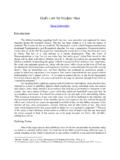
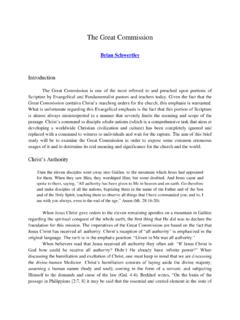
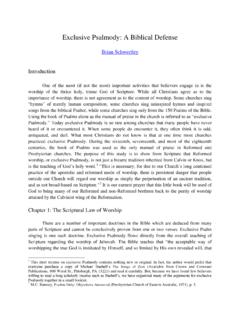
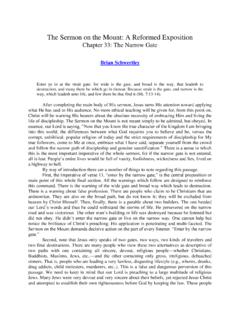
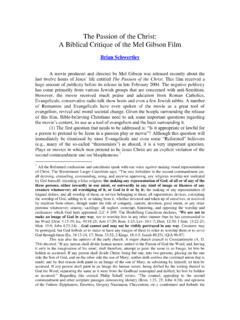
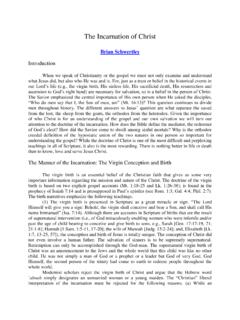
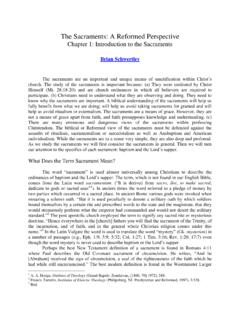

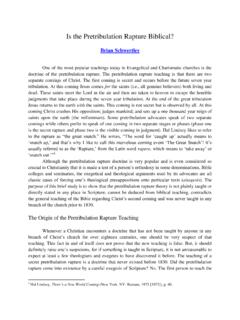
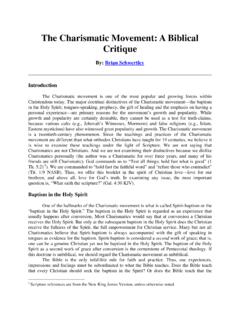
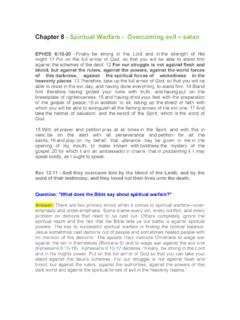
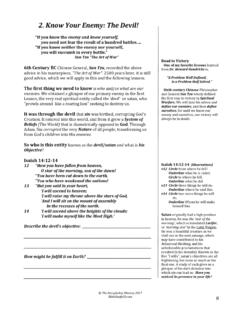
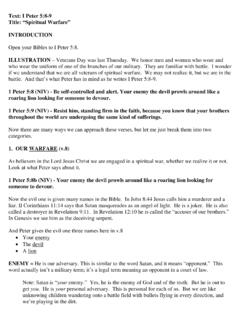

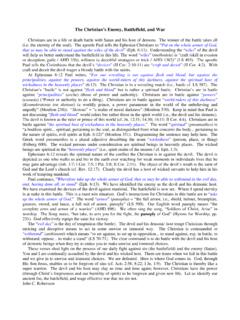
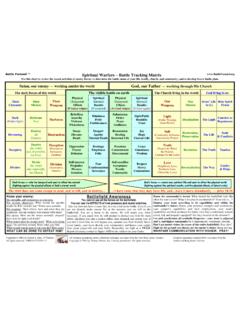
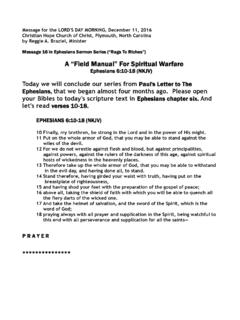
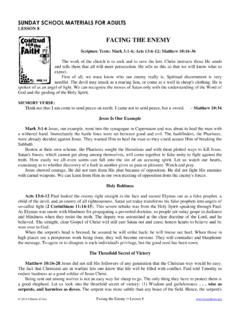
![[8-22-16] Sa - dalecitybaptist.org](/cache/preview/b/e/0/3/a/4/9/6/thumb-be03a496a809b3423bc82167fc770316.jpg)
